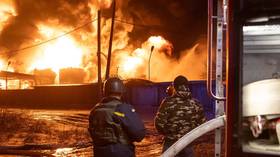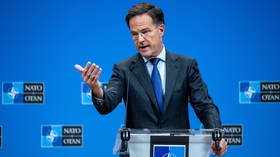Lithuania says ‘no’ to hammer and sickle
Lithuania has moved to ban the public display of Soviet symbols, the toughest restrictions anywhere in the former Soviet Union. The government says it wants to remove all reminders of Soviet rule, which it equates with the Nazi regime.
A public display of the Soviet flag, Soviet army uniform or Soviet decorations or playing the Soviet anthem is no longer allowed in Lithuania.
Vilja Abramikiene, the creator of the law, says she'll visit Russia only when Lenin's body is buried and a museum of the Bolsheviks crimes against people opened at the mausoleum.
“It was the time of two terrible and inhuman regimes – Nazi and Bolshevik. We can't even say which regime was more harmful for our people. We can't allow it to repeat itself. We don't need any propaganda for them either,” she says.
In 1940 the Lithuanian Republic became part of the USSR. A year later it was occupied by the Nazis, but in 1944 the Red army liberated Lithuania and Soviet rule was re-established there for the next 46 years.
When Lithuania became independent – the first of 15 Soviet republics – that very period became the focus of many disputes between the two countries. While Vilnius calls the years of the communist regime ‘Soviet occupation’, Russia views it as liberation.
Larisa Dmitrieva from the Russians of Lithuania Party says this law is dangerous time-wasting: “Some deputies seem to have no intention of dealing with real problems – economic, fuel, social. Instead they are throwing stones at Russia. We don't have to live in the past.”
But some believe that going back to the past can be very useful. The western media has nicknamed an open-air museum in the southern Lithuanian town of Grutas ‘Stalin's world’. Statues of communist icons are displayed alongside one and a half million exhibits from Soviet life – the past is well and truly reflected there, just as it was.
The park owner, Vilumas Malinauskas, used to live in the USSR. Vilumas says banning Soviet symbols will do nothing, which is why he's doing the opposite. Since 1999 his family has already spent 2 million euros gathering Soviet symbols.
“That was one of the most terrible pages of Lithuania's history. We can't just rip it from people's mind. People have to know what any dictatorial regime can end up with,” he believes.
Meanwhile, many question just how far this law will go. No one can tell whether the current Russian anthem will have to be silenced as it employs the melody of the Soviet national anthem.












